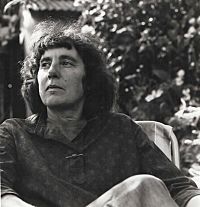Zelda Nolte facts for kids
Quick facts for kids
Zelda Nolte
|
|
|---|---|

Nolte c. 1970s
|
|
| Born | 1929 Cape Town, South Africa
|
| Died | 2003 (aged 74) Granada, Spain
|
| Nationality | South African, British |
| Education | Zürcher Hochschule der Künste Zurich Switzerland |
| Alma mater | University of Cape Town Michaelis School of Fine Art |
| Known for | Sculpture, woodcuts, woodblock printing |
| Style | Modern art Abstract art |
| Movement | Postwar art, Contemporary art |
Zelda Nolte (1929–2003) was a talented artist. She was a sculptor and a printmaker. She was born in South Africa and also had British nationality. Zelda Nolte created amazing artworks using wood and other materials.
Contents
Zelda Nolte's Education
Zelda Nolte loved learning about art. She studied at the Kunstgewerbeschule Zürich in Switzerland. This school is now known as the Zürcher Hochschule der Künste. There, she learned from a famous teacher named Johannes Itten.
She also studied sculpture at the Michaelis School of Fine Art. This art school is part of the University of Cape Town in South Africa. Her teacher there was Professor Lippy Lipshitz.
Where Can You See Her Art?
Zelda Nolte's art has been shown in many places around the world. In 1963, she represented South Africa at the Sao Paulo Bienale. This is a very important art show in Brazil.
You can find her artwork in big art collections. Some of her pieces are at the Iziko South African National Gallery in Cape Town. Others are at the New Hall Art Collection at the University of Cambridge in the UK.
Zelda Nolte's Artistic Creations
Zelda Nolte was known for two main types of art: sculpture and woodblock prints.
What is Sculpture?
Sculpture is the art of making three-dimensional shapes. Artists create sculptures by carving, molding, or joining materials. Zelda Nolte often used wood for her sculptures.
What is Woodblock Printing?
Woodblock printing is a way to make prints using a carved piece of wood. The artist carves a design into a block of wood. Then, they put ink on the raised parts of the carving. Finally, they press the block onto paper to create an image.
Images for kids
 | William Lucy |
 | Charles Hayes |
 | Cleveland Robinson |






